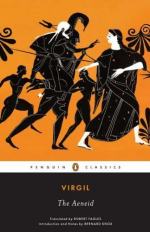|
This section contains 7,095 words (approx. 24 pages at 300 words per page) |

|
SOURCE: "Morality, Mortality, and the Public Life: Aeneas the Politician," in The Antioch Review, Vol. 32, No. 4, Fall/Winter, 1973, pp. 649–64.
In the following essay, Stewart emphasizes the political didacticism of the Aeneid, claiming the "essential subject" of the poem "is the 'education ' of a political leader."
In his 1961 lectures from the Oxford Chair of Poetry Robert Graves labeled Virgil the "anti-poet"—in Graves-peak, roughly, the Anti-Christ—and denounced him for "pliability … subservience … narrowness; his denial of the stubborn imaginative freedom that the true poets who preceded him had valued; his lack of originality, courage, humour, or even animal spirits…. " Graves' performance, long awaited as the most spectacular clash of humors in a generation, was really rather tame, if not conventional. Most students of Virgil had heard that litany before, based as it is on the almost cliché image of the poet in the modern era, a shaggy rebel...
|
This section contains 7,095 words (approx. 24 pages at 300 words per page) |

|


